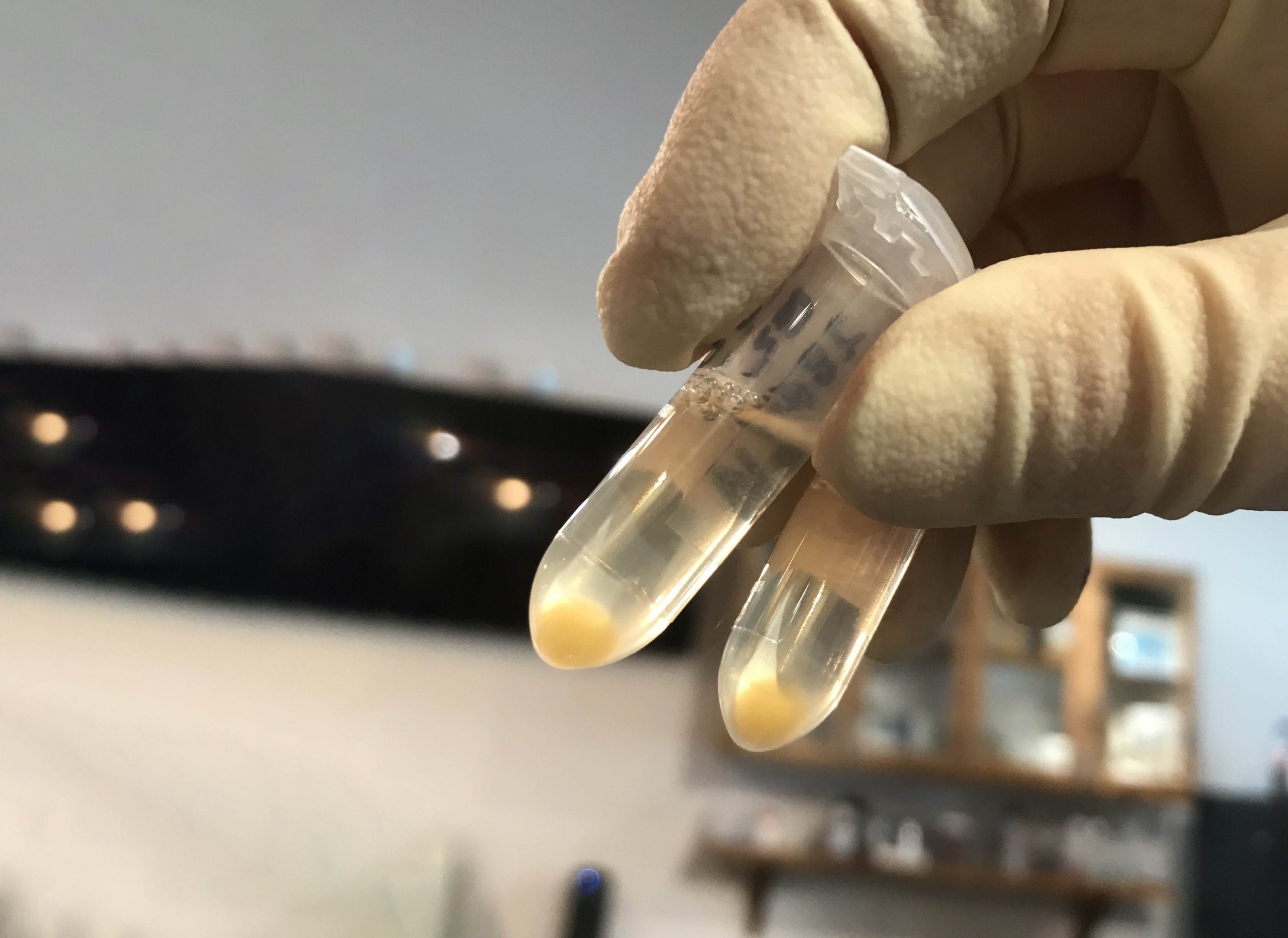Wyoming Couple Gifts Robot to Jackson Nonprofit Brain Chemistry Labs
Jackson, Wyoming – August 10, 2023
A generous gift from Dr. Denis R Lyman & Diane K Robards Lyman Foundation in Wyoming will bring rapid diagnosis of ALS much closer to the patients and their families.
Dr. Rachael Dunlop and Stewart Wood operate the new robot in the Brain Chemistry Labs.
This robot has sped up the validation process for the new microRNA ALS diagnostic test invented by the not-for-profit Brain Chemistry Labs.
The test is made from a standard blood draw in which small particles called extracellular vesicles released by the brain into the bloodstream are extracted.
Once concentrated, microRNA is extracted and sequenced.
The Brain Chemistry Labs team, led by Dr. Sandra Banack and Dr. Rachael Dunlop, discovered that a “fingerprint” of eight specific microRNAs distinguishes ALS patients from healthy people.
Using blood plasma samples from a Phase II clinical trial and the Centers for Disease Control National ALS Biorepository, the Brain Chemistry Labs team has reproduced this result four times.
The gift of a liquid-handling robot from The Dr. Denis R Lyman & Diane K Robards Lyman Foundation moves the diagnostic test one step closer to high throughput, making it an attractive prospect for licensing by a pharmaceutical company. Automated pipetting increases the speed of analysis and reduces human error during sample preparation.
Dr. Sandra Banack holds a sample of neurally enriched exosomes extracted from an ALS patient blood sample.
The scientists affectionately refer to the robot as “Nevada” after the first volunteer at the Brain Chemistry Labs. Nevada Robards was an early pioneer in the development of the whitewater rafting industry in Jackson Hole and was Diane Lyman’s mother.
Contact: Marya King, marya@ethnomedicine.org, 224-358-6578
Alzheimer’s Blood Diagnostic Test
Dr. Sandra Banack analyzing exosome test data.
At Brain Chemistry Labs, contrary to many other labs, we support the idea that misfolded β-amyloid and tau proteins are consequences rather than causes of Alzheimer’s disease.
As a result, we fear using β-amyloid and tau as blood-borne markers to diagnose and treat Alzheimer’s disease is too late in the disease process to modify the outcome.
We recently published our discovery of a unique metabolite that can diagnose Alzheimer’s at far earlier stages. Our test may even be predictive in pre-symptomatic cases.
As a way of increasing the sensitivity of the test, we will expand the number of blood samples in our cohort by incorporating blood samples from our upcoming clinical trial for Mild Cognitive Impairment, scheduled to commence in August, 2022.
New Alzheimer’s Biomarker May Facilitate Rapid Diagnosis
Discovery of a unique ratio of metabolites from blood samples of early-stage Alzheimer’s patients promises to speed diagnosis of Alzheimer’s disease.
Although symptoms of advanced Alzheimer’s disease are well known, diagnosis of Alzheimer’s disease in its earliest stages requires careful cognitive testing by neurologists.
Discovery of a unique ratio of metabolites from blood samples of early-stage Alzheimer’s patients promises to speed diagnosis, allowing earlier treatments to be initiated.
“We were delighted to discover that the ratio of two molecules, 2-aminoethyl dihydrogen phosphate and taurine, allows us to reliably discriminate samples of early-stage Alzheimer’s patients from controls,” said Dr. Sandra Banack, lead author of the report in PLOS ONE and Senior Scientist at the Brain Chemistry Labs in Jackson Hole.
Dr. Sandra Banack works on the amino acid analyzer in the Brain Chemistry Labs, Jackson, Wyoming.
The blood samples were drawn from patients enrolled in an FDA-approved Phase II trial at Dartmouth Hitchcock Medical Center in New Hampshire and then shipped to the Brain Chemistry Labs for analysis. Current attempts to diagnose Alzheimer’s disease from blood samples depend on the presence of amyloid fragments, the molecules that cause brain tangles and plaques.
“At the Brain Chemistry Labs, we consider amyloid plaques to be a consequence rather than the cause of Alzheimer’s disease,” Dr. Paul Alan Cox, Executive Director of the Brain Chemistry Labs explains. “What is exciting about this new discovery is that it does not depend on amyloid and the assay can be performed on analytical equipment that is already present in most large hospitals.”
Their report, written with Alzheimer’s expert Dr. Aleksandra Stark, “A Possible Blood Plasma Biomarker for Early-stage Alzheimer’s Disease” is being published this week in PLOS ONE.
About the Brain Chemistry Labs: The Brain Chemistry Labs is a not-for-profit research institute based in Jackson Hole focused on improving outcomes for patients suffering from Alzheimer’s, ALS, and other neurodegenerative illnesses.
Contacts:
Dr. Sandra Banack, Tel: 307-734-1680, sandra@ethnomedicine.org
Dr. Paul Alan Cox, Tel: 801-375-6214, paul@ethnomedicine.org
Download our press release here








